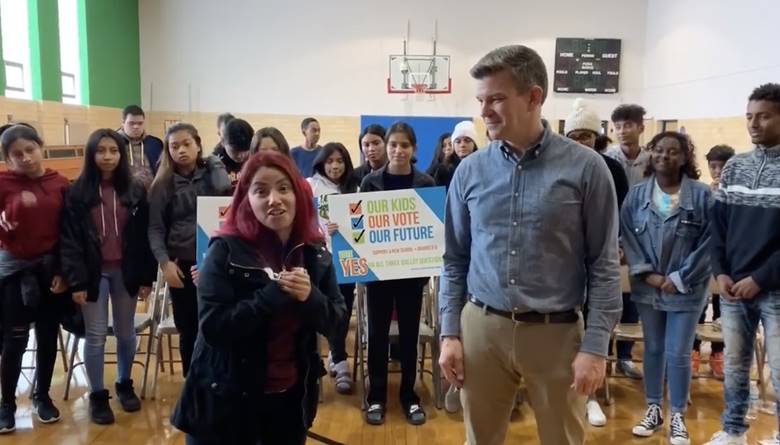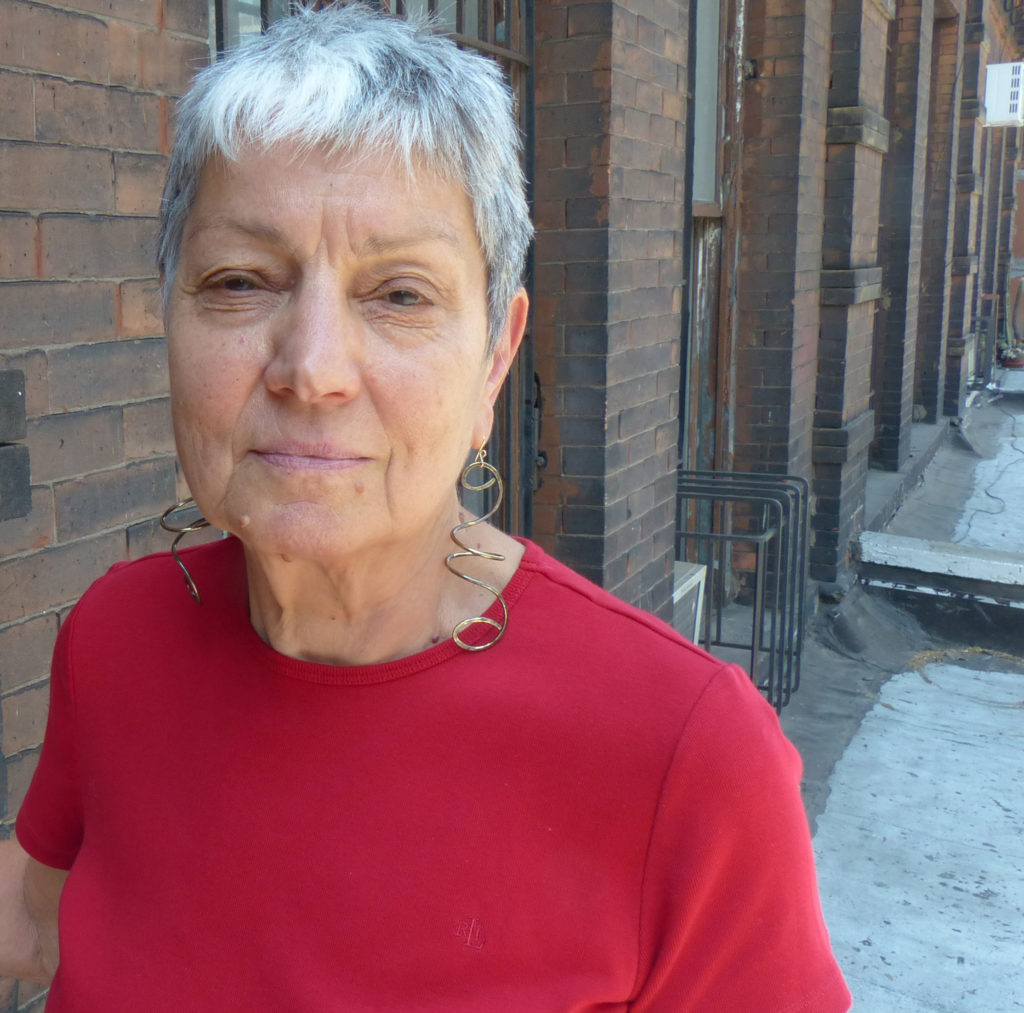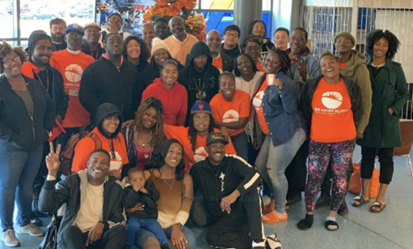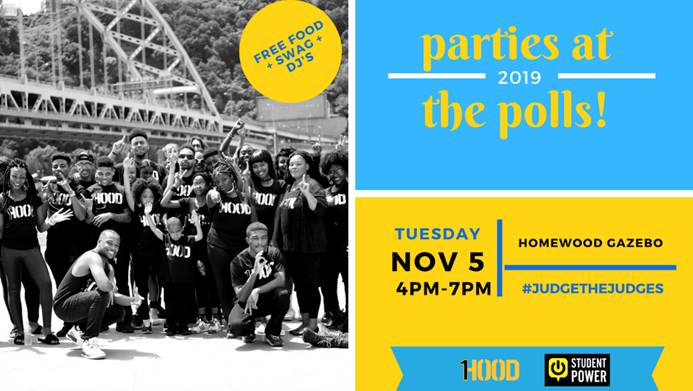OPINION: THE MOVEMENT VOTER PROJECT IS WORKING TO ADVANCE PROGRESSIVE CANDIDATES & CAUSES NATIONWIDE

UNIDOS MN helped win a referendum to fund schools in Worthington, Minnesota, in the county that received the second most unaccompanied minors per capita of anywhere in the country. One of the three ballot measures passed by just 17 votes. MVP invested seed funding to launch UNIDOS in 2017. Photo: MVP.

The 2016 election spurred many people into action to counteract what we knew would be a disastrous presidency. The inauguration was immediately followed by a huge women’s march. Shortly after, many new groups formed, and people who had never been involved in politics joined them, started their own groups, or even ran for office and were elected. All of this work resulted in the Democrats taking back the U. S. House of Representatives in 2018, and the recent wins in Virginia, Kentucky and Louisiana. Despite these promising signs, we are still facing the possibility that the current occupant of the White House may be re-elected.
I have been an activist for most of my adult life. I live in the bluest of blue states, and I’m often stymied by how hard it is to make a difference in red and purple states. Like many others who live in areas with high numbers of Democrats, I have gone to other states to knock on doors, beginning with Barack Obama’s first presidential campaign, and more recently in New York’s District 19 for U.S. Rep. Anthony Delgado. I have called legislators in other regions about bills that were hanging in the balance, (such as the Affordable Care Act), written postcards to support Democratic candidates in districts that could be flipped, and contributed to campaigns across the country.
All of this work is important and has resulted in some gains, but I am most excited about the Movement Voter Project (MVP), a national organization based in Northampton that works to strengthen progressive power at all levels of government. I am a member of the Western Mass Organizing Committee. Very simple ideas are often the most brilliant, and the idea behind MVP is to connect the dots between grassroots activism and electoral politics by seeking out, vetting, and funding local community organizing groups in areas most affected by economic and racial injustice. Based in their communities, these groups know their neighbors, and the issues that people care about. Community organizing groups can engage people to make real change by turning out votes, up and down the ticket. With $20 million raised so far this year, MVP is supporting almost 500 groups that not only get out the vote, but organize communities for long-term progressive change. Teams across the country raise money by contacting individual donors, hosting house parties, and getting the word out about MVP’s great work.
The grassroots groups MVP funds have shown that they make a difference. Most recently, in the 2019 special election in Virginia, MVP supported the New Virginia Majority with a grant of $475,000, which helped to turn Virginia totally blue for the first time since 1994. Another example is the special U.S. Senate seat election in 2017 in Alabama between Republican Roy Moore and Democrat Doug Jones. When the press reported that most Black voters were unaware of the special election, MVP sprang into action, and funded four grassroots groups – Woke Vote, Righteous Vote, Black Voters Matter, and Alabama Grassroots Mobilization Project. These groups organized in the twenty-one counties with majority Black populations, and on the campuses of Alabama’s historically Black colleges and universities to get out the vote. The black voter turnout was huge and Jones won by more than 21,000 votes.

Virginia’s recent election. MVP moved $475,000 overall to partners in Virginia. Photo: MVP
In 2018 in New Hampshire, MVP funded groups in communities of color in the northern part of the state. With the MVP’s support, they were able to get out the vote for U.S. Sen. Maggie Hassan, who won by a 1,207 vote margin. With Hassan’s vote in the Senate the Affordable Care Act was saved. These examples are only of few of what the MVP has made possible all over the country since 2014.

MVP’s criteria for funding groups is clear and so is their reporting process. Groups must be engaged in getting out the vote and building towards a larger movement for progressive change. To this end, these local organizations must function year-round, work collaboratively with other groups, and focus on communities of color, low income people, and youth. The MVP team works closely with the groups it funds, assessing immediate needs and challenges, and highlighting successes to build momentum. Groups submit reports to MVP on an ongoing basis, including qualitative and quantitative indicators of success and challenges. Groups may be well established or just starting out. If they are new, MVP might fund them for a small amount, see how they fare,, and then give them a larger grant. Eighty percent of the grant funds must be used to get out the vote, while the other twenty percent can be used for group infrastructure.
Working with MVP these past few months is giving me hope, in this time of terrible peril, for our democracy and the world.
To find out more about MVP click here. Be sure to watch the short video. Please do not hesitate to contact me at avakian@wost.umass.edu. I would love to answer any questions you might have. You can helo by donating, telling your friends, hosting a house party, or joining our team. You can make a general donation to MVP, contribute to the Five State Fund, or to a particular group. They are organized by state or focus so you can find a group that meets your particular interests.
Arlene Avakian, of Northampton, was one of the founders of Women, Gender, Sexuality Studies at the University of Massachusetts Amherst and has been a professor emeritus since 2011. She has been involved in many efforts to change the world for the better for the last 50 years.
